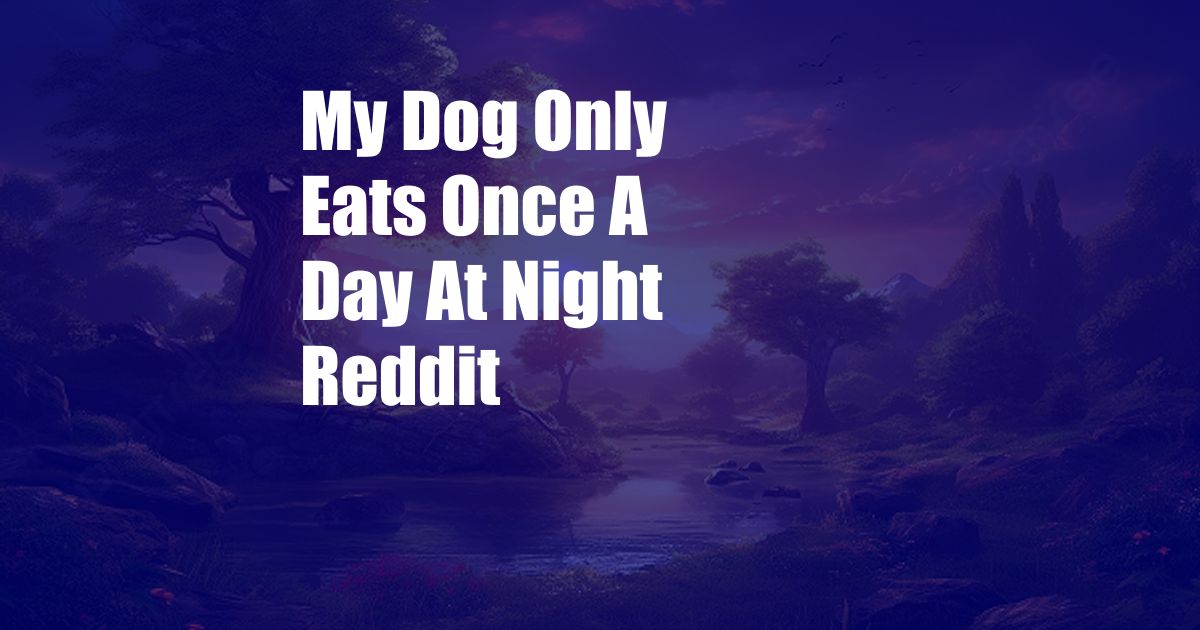
My Dog Only Eats Once a Day at Night: A Journey Through Understanding Canine Eating Habits
In the tapestry of pet ownership, one thread that often sparks questions and concerns is the frequency and timing of our furry companion’s meals. While some dogs relish the joy of breakfast, lunch, and dinner, others, like my beloved golden retriever, Murphy, prefer a more streamlined approach: eating once a day, at night.
This nocturnal eating pattern, while initially perplexing, has led me on a fascinating journey into the intricacies of canine nutrition and behavior. As I navigate this topic, I invite you to join me in unraveling the mystery behind why some dogs like to dine under the cloak of darkness.
The Twilight Feast: Exploring Nocturnal Eating Habits in Dogs
Contrary to popular belief, once-a-day eating is not an anomaly among dogs. In fact, wild canines, from which our domesticated furry friends evolved, typically hunt and feed once or twice a day, often coinciding with dusk or dawn.
This ancestral pattern has left an imprint on our modern dogs, with some preferring to channel their inner wolves and dine after the sun sets. Nocturnal eating may also be influenced by a dog’s activity level and metabolism. For instance, highly active dogs may burn through calories more quickly and prefer to replenish their energy stores in the evening.
<h3 id=”The Good, the Bad, and the Balanced: Weighing the Pros and Cons of Once-a-Day Feeding
As with any dietary choice, once-a-day feeding has both advantages and potential drawbacks. Understanding these can help you make an informed decision about your dog’s feeding schedule.
Advantages:
- Reduced risk of obesity: Eating once a day can help prevent overfeeding, which is a leading cause of obesity in dogs.
- Improved digestion: Eating less frequently allows the digestive system more time to rest and fully digest food.
- Simulates natural feeding patterns: Nocturnal feeding aligns with the ancestral habits of wild canines.
Disadvantages:
- Potential for hunger: If your dog is not accustomed to eating once a day, they may become hungry and restless during the day.
- Risk of digestive upset: Eating a large meal once a day can put a strain on the digestive system, especially in small dogs.
- May not be suitable for all dogs: Puppies, pregnant or nursing dogs, and dogs with certain medical conditions may require more frequent feedings.
It’s important to consult with your veterinarian before making any changes to your dog’s feeding schedule, as they can provide personalized advice based on your dog’s age, breed, and health status.
<h3 id=”Tips for Transitioning to Once-a-Day Feeding
If you’re considering transitioning your dog to once-a-day feeding, it’s crucial to do so gradually over several days or weeks. Here are some expert tips to make the process smooth:
- Start by reducing the number of meals gradually: Instead of going straight from two or three meals a day to one, start by decreasing the frequency to twice a day for a few days.
- Increase the portion size at night: As you reduce the number of meals, gradually increase the amount of food you give your dog at their nighttime meal.
- Monitor your dog’s behavior: Pay attention to your dog’s energy levels, hunger cues, and digestive health during the transition. If they seem excessively hungry or have digestive issues, adjust the feeding schedule or consult your veterinarian.
- Make sure your dog has access to water: Dogs should have access to fresh water at all times, regardless of their feeding schedule.
Remember, every dog is different, and the ideal feeding schedule may vary. Always prioritize your dog’s individual needs and seek professional advice if necessary.
<h2 id=”FAQs: Unraveling Common Queries About Once-a-Day Feeding
-
Q: Is it okay for my puppy to eat only once a day?
A: Puppies typically require more frequent feedings, as they have faster metabolisms and smaller stomachs. Consult with your veterinarian for specific feeding guidelines for puppies.
-
Q: Can once-a-day feeding cause bloat?
A: Bloat is a serious medical condition that can occur in dogs of all ages and feeding schedules. However, rapid eating, overfeeding, and certain breeds may increase the risk of bloat.
-
Q: What are some health concerns associated with once-a-day feeding?
A: While once-a-day feeding can be beneficial for some dogs, it’s important to be aware of potential digestive issues, such as indigestion, gas, and constipation. Monitor your dog’s health closely and consult with your veterinarian if any concerns arise.
Conclusion
The world of canine nutrition is a vast and fascinating tapestry, with each dog having unique needs and preferences. While some dogs thrive on the traditional three meals a day, others, like my enigmatic Murphy, find solace and sustenance in the nocturnal feast. Understanding the nuances of once-a-day feeding can help you make informed decisions about your furry friend’s diet.
Whether you choose to embark on a once-a-day feeding journey or stick to a more frequent schedule, remember that the well-being of your canine companion should always be your guiding star. Your veterinarian can be a valuable resource in navigating the ever-evolving landscape of pet nutrition, ensuring that your dog lives a long, healthy, and happy life.
Are you interested in learning more about once-a-day feeding for dogs? Share your thoughts and experiences in the comments below, and let’s continue the conversation!